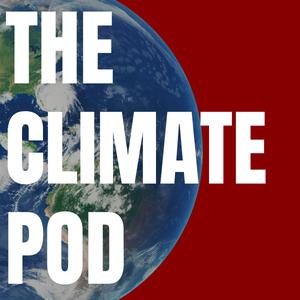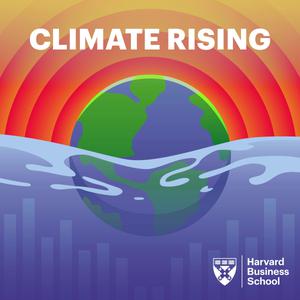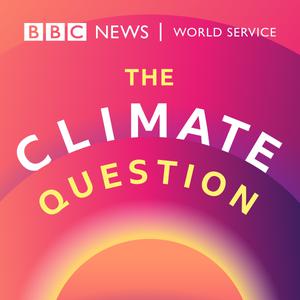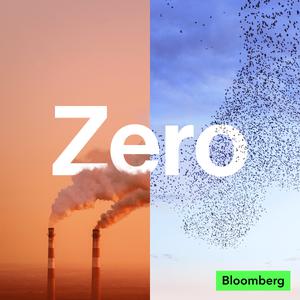
The Climate Pod
The Climate Pod
- 35 minutes 16 secondsThe American Climate Corps Explained (with White House National Climate Advisor Ali Zaidi)
The American Climate Corps, an initiative that will employ 20,000 Americans in its first year to combat the climate crisis, is launching this week as the Biden Administration delivers on another campaign promise. Learning from previous national service programs such as FDR's Civilian Conservation Corps and AmeriCorps, the American Climate Corps will give young people the opportunity to learn new skills, build a pathway to a career in the clean energy economy, and earn a competitive wage.
On this special Earth Day 2024 episode, White House National Climate Advisor Ali Zaidi joins us to explain how the American Climate Corps works, how people can participate, and why more money should be invested in growing the program to expand its reach and impact. We also talk about President Biden's Solar For All announcement which will fund $7 Billion in clean energy grants.
Learn more about the American Climate Corps at www.ACC.gov
As always, follow us @climatepod on Twitter and email us at [email protected]. Our music is "Gotta Get Up" by The Passion Hifi, check out his music at thepassionhifi.com. Rate, review and subscribe to this podcast on iTunes, Spotify, Stitcher, and more! Subscribe to our YouTube channel! Join our Facebook group.
22 April 2024, 11:23 am - 1 hour 9 minutesCNN's Bill Weir On The Life Lessons Found In Climate Reporting
For years, we've watched as Bill Weir has brought climate storytelling to one of the biggest news networks on television. On CNN, Bill has traveled the world to cover everything from extreme weather disasters to cutting-edge climate solutions. And throughout an incredibly eventful career, he's learned life lessons he hopes his children and others will consider to preserve what we love most on this warming planet. Bill joins the show this week to explain why chose this career path, what he enjoyed most about his early days as a sports reporter and actor, and what he sets out to accomplish every day on the climate beat.
Bill Weir is the Chief Climate Correspondent at CNN. He’s an Emmy Award-winning journalist, who has reported from all fifty states and more than 50 countries on every continent. His new book is Life as we Know it (Can Be) - Stories of People, Climate, and Hope in a Changing World.
As always, follow us @climatepod on Twitter and email us at [email protected]. Our music is "Gotta Get Up" by The Passion Hifi, check out his music at thepassionhifi.com. Rate, review and subscribe to this podcast on iTunes, Spotify, Stitcher, and more! Subscribe to our YouTube channel! Join our Facebook group.
17 April 2024, 7:00 am - 1 hour 1 minuteThe Washington Post's Shannon Osaka On Microplastics, Extreme Weather Costs, And Covering Climate In 2024
Shannon Osaka has been one of our favorite climate journalists for years. So we were incredibly excited to have her on this week for a wide-ranging conversation on a variety of climate issues - like microplastics, extreme weather costs in the US, and covering climate change as we exceed 1.5 degrees of warming above pre-industrial levels. Shannon also explains how she got into climate journalism after studying the science of climate change, how she approaches her work, and the challenges of covering climate in 2024.
Shannon Osaka is a climate reporter covering policy, culture, and science for The Washington Post. Read her recent pieces we discuss on this week's episode:
Why Americans pay so much more than anyone else for weather disasters
With microplastics, scientists are in a race against time
Earth breached a feared level of warming over the past year. Are we doomed?
Read more of Shannon's work here
As always, follow us @climatepod on Twitter and email us at [email protected]. Our music is "Gotta Get Up" by The Passion Hifi, check out his music at thepassionhifi.com. Rate, review and subscribe to this podcast on iTunes, Spotify, Stitcher, and more! Subscribe to our YouTube channel! Join our Facebook group.
10 April 2024, 7:00 am - 1 hour 16 minutesWhy Capitalism Won't Save the Planet (w/ Brett Christophers)
For decades, the biggest pushback against renewable energy was that it was more expensive to generate than electricity that came from the burning of fossil fuels. But all that changed in 2016 when both solar and wind-generated electricity became cheaper than electricity generated by coal and natural gas, at least when using the industry-standard metric, Levelized Cost of Energy. Despite the fact that renewable energy has overcome its biggest obstacle and can now be generated cheaper than fossil fuels, investments in fossil fuels continue to increase and new renewable generation development is not keeping pace with increases in demand. What happened?
Brett Christophers is a Professor at the Institute for Housing and Urban Research at Uppsala University. He joined the podcast this week to explain why price isn't the most important metric to look at when determining the prospects for the development of clean energy projects. His new book, "The Price is Wrong: Why Capitalism Won't Save the Planet", provides some answers to the question of why renewables aren't growing as quickly as we need them to, given that the price of renewables have fallen well below their fossil fuel counterparts. His critiques of capitalism, energy markets, and our fascination with the Levelized Cost of Energy are some of the most compelling arguments you're likely to hear on why we need transformative changes instead of incremental reforms to our existing economic system, especially when it comes to how electricity is bought and sold.
Read "The Price is Wrong"
As always, follow us @climatepod on Twitter and email us at [email protected]. Our music is "Gotta Get Up" by The Passion Hifi, check out his music at thepassionhifi.com. Rate, review and subscribe to this podcast on iTunes, Spotify, Stitcher, and more! Subscribe to our YouTube channel! Join our Facebook group.
3 April 2024, 7:00 am - 1 hour 1 minuteHow Do You Behave Ethically In A Climate Crisis? (w/ Travis Rieder)
The climate crisis presents us with a number of moral challenges. We all produce emissions, but there are massive differences and inequities in how much pollution each individual is responsible for and who is harmed the most by the consequences. As the very real impacts of the crisis only become more obvious and deadly, we continue to ask ourselves: what is our responsibility?
In this week's show, we dig into some of the tough ethical considerations for living in a climate crisis. To do so, we talk to Travis Rieder, an associate research professor at the Johns Hopkins Berman Institute of Bioethics. Rieder is the author of multiple books including In Pain: A Bioethicist’s Personal Struggle with Opioids. His latest book is Catastrophe Ethics: How to Choose Well in a World of Tough Choices. We discuss the conversations around individual responsibility vs. collective action, how to determine our best path for fighting climate change, and what it means to exist between purity and nihilism.
Read Catastrophe Ethics: How to Choose Well in a World of Tough Choices
As always, follow us @climatepod on Twitter and email us at [email protected]. Our music is "Gotta Get Up" by The Passion Hifi, check out his music at thepassionhifi.com. Rate, review and subscribe to this podcast on iTunes, Spotify, Stitcher, and more! Subscribe to our YouTube channel! Join our Facebook group.
27 March 2024, 7:01 am - 44 minutes 38 secondsElizabeth Kolbert on Climate Rhetoric vs Climate Reality
In 2021, Greta Thunberg spoke to the youth climate movement at an event leading up to COP26. Her famous "Blah, Blah, Blah" speech contrasted all of the things world leaders had said about the climate crisis and what those same leaders had actually done to reduce emissions and create policies to mitigate and adapt to the climate crisis. Three years later, very little has changed. Of the 128 countries that set Net Zero goals, only five percent have taken the required first steps toward achieving those goals.
Pulitzer Prize-winning journalist Elizabeth Kolbert joins the podcast this week to discuss how the climate crisis gets talked about by world leaders, activists, scientists, and the media may differ from the actual facts of the world's warming situation. Her new book "H is for Hope: Climate Change from A to Z" is a collection of 26 essays on various aspects of the climate crisis which tell the complete picture of what's going on, what's led us to this point, and where we could go from here.
Like Elizabeth's previous books, such as "Field Notes from a Catastrophe", "The Sixth Extinction", and "Under a White Sky", "H is for Hope" is an insightful and sobering book from one of today's great climate writers.
Read "H is for Hope"
As always, follow us @climatepod on Twitter and email us at [email protected]. Our music is "Gotta Get Up" by The Passion Hifi, check out his music at thepassionhifi.com. Rate, review and subscribe to this podcast on iTunes, Spotify, Stitcher, and more! Subscribe to our YouTube channel! Join our Facebook group.
20 March 2024, 7:00 am - 58 minutes 50 secondsDegrowth, Malthus, and the Climate Crisis (w/ Giorgos Kallis)
Over the last century, economic growth, as measured by increases in countries' Gross Domestic Product, has been the key indicator of success. And while GDP has skyrocketed in many countries, so has fossil fuel use, deforestation, and the destruction of natural ecosystems. On top of that, inequality has actually gotten worse in many countries and incomes, adjusted for inflation, have stagnated for many parts of these "growing" economies. It seems this relentless focus on growth has not created the kind of world that most people want to live in.
Professor Giorgos Kallis is an ecological economist, political ecologist, and Catalan Institution for Research and Advanced Studies Professor at the Institute of Environmental Science and Technology in Barcelona. He's also the author of several books about degrowth economics - the field of economics that questions the insatiable need for growth and seeks an alternative societal structure that supports everyone, regardless of a country's ability to grow GDP. Professor Kallis joins the show to talk about degrowth economics and why it is critical to achieve the degrowth goals if we want to reduce the negative impacts of the climate crisis.
We also discuss the role that 18th century philosopher and theologian Thomas Malthus had on modern economics, why he was so wrong about inequality and limits, and some of the ideas that get attributed to him that weren't actually his.
Check out these two books by Professor Kallis:
"Limits: Why Malthus Was Wrong and Why Environmentalists Should Care"
As always, follow us @climatepod on Twitter and email us at [email protected]. Our music is "Gotta Get Up" by The Passion Hifi, check out his music at thepassionhifi.com. Rate, review and subscribe to this podcast on iTunes, Spotify, Stitcher, and more! Subscribe to our YouTube channel! Join our Facebook group.
13 March 2024, 7:00 am - 52 minutes 26 secondsThe Adventurers Behind A Thrilling New Climate Documentary (w/ Dr. Lonnie Thompson, Danny O'Malley, and Dr. Alex Rivest)
It's incredible how dramatic climate science can be. That was my first thought after I watched the new documentary, Canary, which chronicles the life and career of Dr. Lonnie Thompson. This week, the subject behind the film, Dr. Thompson, and the co-directors of the documentary, Danny O'Malley and Dr. Alex Rivest, explain how the film came together and the thrilling story behind its development. We discuss how to tell compelling climate stories, what motivates their work, and what decades of glacier science can teach us about the climate crisis.
Lonnie G. Thompson, a Distinguished University Professor at The Ohio State University, and senior research scientist, specializes in paleoclimatology, ice cores, and climate change.
Alex Rivest is a Massachusetts Institute of Technology-trained PhD Neuroscientist. Having worked alongside Nobel Prize winner Dr. Susumu Tonegawa, his research has been published in two of the most highly renowned scientific journals, Science and Nature Neuroscience.
Danny O'Malley is a Grammy nominated and James Beard nominated film director. Best known for his work on Netflix's Chef's Table, where he serves as co-executive producer and a director.
As always, follow us @climatepod on Twitter and email us at [email protected]. Our music is "Gotta Get Up" by The Passion Hifi, check out his music at thepassionhifi.com. Rate, review and subscribe to this podcast on iTunes, Spotify, Stitcher, and more! Subscribe to our YouTube channel! Join our Facebook group.
Rent Canary
6 March 2024, 8:00 am - 52 minutes 30 secondsHow Can The Climate Movement Build Real Power? (w/ Dana Fisher)
Who can the climate movement turn to for real change? Politicians? Business leaders? International negotiators? The reality, as Professor Dana Fisher argues, is that despite major gains for climate action in recent years, none of our leaders are adequately advancing solutions at the speed and scale neccessary to meet the actual crisis we face. And because we need change to happen much faster, the climate movement needs to build its own power in order to help solve the biggest problems in ever sector of society. So how do we actually do that?
We explore that on today's show and discuss Professor Fisher's new book Saving Ourselves - From Climate Shocks to Climate Action. We discuss what the climate movement can learn from international efforts like the Paris Agreement and the Kyoto Protocal, how the successes of the Civil Rights Movement and other social movements can guide climate activists, and how climate activism is changing as we approach major elections in 2024.
Dana R. Fisher is the director of the Center for Environment, Community, and Equity and a professor at the School of International Service at American University.
Read Saving Ourselves - From Climate Shocks to Climate Action
As always, follow us @climatepod on Twitter and email us at [email protected]. Our music is "Gotta Get Up" by The Passion Hifi, check out his music at thepassionhifi.com. Rate, review and subscribe to this podcast on iTunes, Spotify, Stitcher, and more! Subscribe to our YouTube channel! Join our Facebook group.
28 February 2024, 8:00 am - 46 minutes 24 secondsWhat's Keeping Nuclear Energy From Playing a Larger Role in Decarbonization? (w/ Dr. Matt Bowen)
The International Energy Agency, among other prominent modelers of our energy future, projects that nuclear energy's current global capacity must double by 2050 in order for the world to hit its decarbonization goals. The annual investments needed to reach this doubling far exceed anything that's being invested today in new nuclear facilities. Just one new nuclear reactor has been successfully built in the United States in the last 30 years, and the United States hasn't financed new reactors in other countries for decades.
If the United States is truly committed to reducing emissions, why aren't we seeing more investment in nuclear energy, a base fuel that could replace coal and natural gas? How do other countries compare to the United States when it comes to investments in new nuclear energy, the costs and project timelines of new nuclear construction, and the regulations and incentives? Dr. Matt Bowen from the Center on Global Energy Policy at Columbia University SIPA joins the podcast today to answer these questions and to provide a detailed look at the current nuclear energy landscape around the world.
Further Reading:
The Uncertain Costs of New Nuclear Reactors
Improving the Efficiency of NRC Power Reactor Licensing
Comparing Government Financing of Reactor Exports
And check out the upcoming Columbia webinar: https://www.energypolicy.columbia.edu/events/reactor-costs-and-decarbonization-efforts/
As always, follow us @climatepod on Twitter and email us at [email protected]. Our music is "Gotta Get Up" by The Passion Hifi, check out his music at thepassionhifi.com. Rate, review and subscribe to this podcast on iTunes, Spotify, Stitcher, and more! Subscribe to our YouTube channel! Join our Facebook group.
21 February 2024, 8:00 am - 55 minutes 53 secondsWhy Is 'New Climate Denial' So Popular On Social Media? (w/ Imran Ahmed)
"It is vital that those advocating for action to avert climate disaster take note of this substantial shift from denial of anthropogenic climate change to undermining trust in both solutions and science itself, and shift our focus, our resources and our counternarratives accordingly."
In the introduction to a new report from the Center for Countering Digital Hate US/UK, founder and CEO Imran Ahmed makes the case that it's a new kind of climate denialism that is spreading so quickly on social platforms. Why? Not only is it due to the lack of content moderation from Big Tech companies and a willingness of cynical media personalities on these platforms to take up the denier mantle, but also an economic incentive structure for content creators that supports misinformation. Imran Ahmed joins the show this week to discuss The New Climate Denial: How social media platforms and content producers profit by spreading new forms of climate denial? and how social media platforms and legislators can help stop the dominance of misinformation online and what could happen if we don't.
As always, follow us @climatepod on Twitter and email us at [email protected]. Our music is "Gotta Get Up" by The Passion Hifi, check out his music at thepassionhifi.com. Rate, review and subscribe to this podcast on iTunes, Spotify, Stitcher, and more! Subscribe to our YouTube channel! Join our Facebook group.
14 February 2024, 8:00 am - More Episodes? Get the App
Your feedback is valuable to us. Should you encounter any bugs, glitches, lack of functionality or other problems, please email us on [email protected] or join Moon.FM Telegram Group where you can talk directly to the dev team who are happy to answer any queries.
 Drilled
Drilled
 Climate Rising
Climate Rising
 TED Climate
TED Climate
 The Climate Question
The Climate Question
 Zero: The Climate Race
Zero: The Climate Race
 Climate One
Climate One